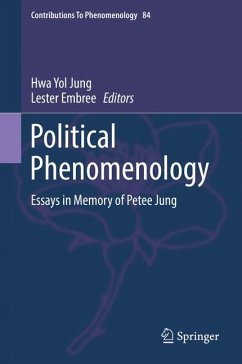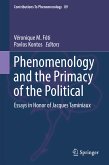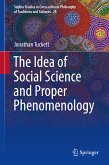Political Phenomenology (eBook, PDF)
Essays in Memory of Petee Jung
Redaktion: Jung, Hwa Yol; Embree, Lester


Alle Infos zum eBook verschenken

Political Phenomenology (eBook, PDF)
Essays in Memory of Petee Jung
Redaktion: Jung, Hwa Yol; Embree, Lester
- Format: PDF
- Merkliste
- Auf die Merkliste
- Bewerten Bewerten
- Teilen
- Produkt teilen
- Produkterinnerung
- Produkterinnerung

Hier können Sie sich einloggen

Bitte loggen Sie sich zunächst in Ihr Kundenkonto ein oder registrieren Sie sich bei bücher.de, um das eBook-Abo tolino select nutzen zu können.
This volume presents political phenomenology as a new specialty in western philosophical and political thought that is post-classical, post-Machiavellian, and post-behavioral. It draws on history and sets the agenda for future explorations of political issues. It discloses crossroads between ethics and politics and explores border-crossing issues. All the essays in this volume challenge existing ideas of politics significantly. As such they open new ways for further explorations BY future generations of phenomenologists and non-phenomenologists alike. Moreover, the comprehensive chronological…mehr
- Geräte: PC
- ohne Kopierschutz
- eBook Hilfe
- Größe: 5.62MB
![Women Phenomenologists on Social Ontology (eBook, PDF) Women Phenomenologists on Social Ontology (eBook, PDF)]() Women Phenomenologists on Social Ontology (eBook, PDF)73,95 €
Women Phenomenologists on Social Ontology (eBook, PDF)73,95 €![The Politics of Recognition in the Age of Digital Spaces (eBook, PDF) The Politics of Recognition in the Age of Digital Spaces (eBook, PDF)]() Benjamin Jj CarpenterThe Politics of Recognition in the Age of Digital Spaces (eBook, PDF)42,95 €
Benjamin Jj CarpenterThe Politics of Recognition in the Age of Digital Spaces (eBook, PDF)42,95 €![Phenomenology and the Primacy of the Political (eBook, PDF) Phenomenology and the Primacy of the Political (eBook, PDF)]() Phenomenology and the Primacy of the Political (eBook, PDF)105,95 €
Phenomenology and the Primacy of the Political (eBook, PDF)105,95 €![Phenomenology of the Political (eBook, PDF) Phenomenology of the Political (eBook, PDF)]() Phenomenology of the Political (eBook, PDF)73,95 €
Phenomenology of the Political (eBook, PDF)73,95 €![Hermeneutics of the Film World (eBook, PDF) Hermeneutics of the Film World (eBook, PDF)]() Alberto BaraccoHermeneutics of the Film World (eBook, PDF)73,95 €
Alberto BaraccoHermeneutics of the Film World (eBook, PDF)73,95 €![The Idea of Social Science and Proper Phenomenology (eBook, PDF) The Idea of Social Science and Proper Phenomenology (eBook, PDF)]() Jonathan TuckettThe Idea of Social Science and Proper Phenomenology (eBook, PDF)40,95 €
Jonathan TuckettThe Idea of Social Science and Proper Phenomenology (eBook, PDF)40,95 €![Edith Stein's An Investigation Concerning the State: Sociality, Nationhood, Ethics (eBook, PDF) Edith Stein's An Investigation Concerning the State: Sociality, Nationhood, Ethics (eBook, PDF)]() Edith Stein's An Investigation Concerning the State: Sociality, Nationhood, Ethics (eBook, PDF)73,95 €
Edith Stein's An Investigation Concerning the State: Sociality, Nationhood, Ethics (eBook, PDF)73,95 €-
-
-
Dieser Download kann aus rechtlichen Gründen nur mit Rechnungsadresse in A, B, BG, CY, CZ, D, DK, EW, E, FIN, F, GR, HR, H, IRL, I, LT, L, LR, M, NL, PL, P, R, S, SLO, SK ausgeliefert werden.
- Produktdetails
- Verlag: Springer International Publishing
- Seitenzahl: 435
- Erscheinungstermin: 13. Juni 2016
- Englisch
- ISBN-13: 9783319277752
- Artikelnr.: 46922686
- Verlag: Springer International Publishing
- Seitenzahl: 435
- Erscheinungstermin: 13. Juni 2016
- Englisch
- ISBN-13: 9783319277752
- Artikelnr.: 46922686
- Herstellerkennzeichnung Die Herstellerinformationen sind derzeit nicht verfügbar.







